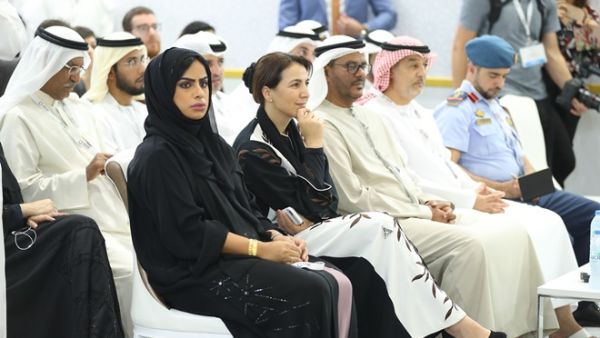The Food Security Center – Abu Dhabi Hosts the Concluding Session of Its Food Security Roundtables

The Food Security Center – Abu Dhabi (FSCAD) hosted the concluding session of its Food Security Roundtables on the sidelines of the eighth edition of SIAL Middle East 2017. Entitled ‘Government and private sector partnership model for enhancing food security in the region’s countries’, the roundtable highlighted the benefits of the public-private partnership (PPP) model in ensuring food security.
Offering officials, experts, decision makers and relevant stakeholders a unique opportunity to exchange concerns and views on food security in the UAE and the wider region, the 60-minute session examined at length the advantages of developing national food security strategies in collaboration with the private sector. As part of this priority, the discussion explored ways in which the two sectors could complement each other in optimizing food production, sourcing and distribution, and highlighted best practices in the food industry and the UAE’s food investments abroad.
The attendees listened to key insights from an expert-led five-member panel moderated by His Excellency Khalifa Al Ali, Managing Director of FSCAD. Other panelists included His Excellency Saeed Al Bahri Salem Al Ameri, General Manager of Abu Dhabi Food Control Authority, His Excellency Tariq Ahmed Al Wahedi, CEO of Agthia Group, Edward Hamod, General Manager of National Feed and Flour Production and Marketing, and Abdulaziz Ahmed Bawazeer, Executive Director of Strategy and Development at ZonesCorp.
The panelists discussed the roles and responsibilities of the government and private sector, the UAE government’s agriculture subsidies, the long- and short-term benefits and profits, and their priorities for both sides. Furthermore, they noted that Abu Dhabi currently boasts 3.5 million livestock, emphasizing the need for more investment and partnership with small and medium-sized enterprises (SMEs). The panelists also praised the role of the UAE’s anti-trust law in driving sustainable economic development, and deliberated the practicality of continuing government agriculture subsidies. During the question-and-answer part of the session, the panelists and attendees shared insight on the benefits of a unified food security center for the GCC region, particularly with regard to imparting expertise and sharing resources.
His Excellency Khalifa Al Ali said: "I thank Her Excellency Mariam Saeed Hareb Al Muhairi, UAE Minister of State for Food Security, for attending today’s crucial session. In addition to enhancing the UAE’s food security, the PPP model has helped UAE-based agriculture companies invest abroad.”
He added: “To date, these investments have directly and indirectly contributed to the creation of countless job opportunities. Today, owing to ‘smart’ agriculture subsidies, FSCAD is part of these overseas projects. We – government and private bodies alike – should be proud of all we have achieved, and should continue refining this framework, supporting SMEs, and awarding more government contracts to UAE-based companies.”
The first session held on day one of SIAL Middle East 2017, themed ‘Regional development and its impact on food security at the region countries’, discussed the most important obstacles that prevent the operation of supply chains of food commodities across the region, as well as the environmental, economic and social impact of these challenges.
Running from December 12 to 14, SIAL Middle East 2017 has drawn the participation of more than 22,000 experts and over 900 exhibitors from food security-focused entities.
The Food Security Center – Abu Dhabi was established in 2010 to oversee the implementation of a unified food security strategy in the UAE. FSCAD seeks to provide all citizens and residents of the UAE with access to healthy, nutritious and safe food under any circumstances, including crises and emergency situations.
Background Information
Food Security Center Abu Dhabi
United Arab emirates was one of the leading countries who realized the importance of food security in its developmental journey. Since its inception until today, this interest in food security have taken it’s organizational and administrational form in the last couple of years. In 2008 when some of the food items have gone up in price, a committee was formed to cover Emirate of Abu Dhabi called “food security committee”.






